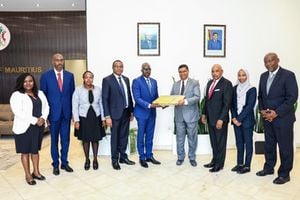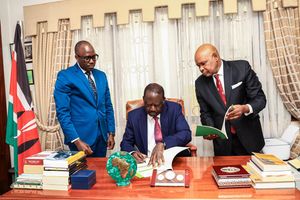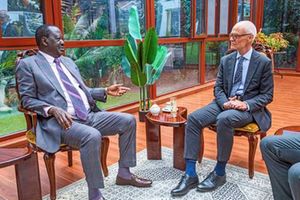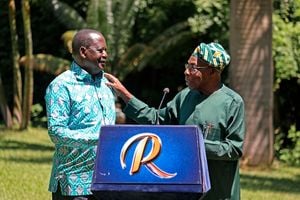
Azimio la Umoja leader Raila Odinga.
Veteran opposition leader Raila Odinga will fervently back the Pan-African Payment and Settlement System if elected the African Union Commission Chairman in February next year, identifying it as a crucial pointer to better continental trade. The system facilitates instant cross-border payments in local currencies between countries, similar to the dedollarisation campaign earlier championed by President William Ruto before he went mute on it.
Dedollarisation refers to countries reducing reliance on the US dollar as a reserve currency, medium of exchange or as a unit of account. It entails the significant reduction in the use of dollars in world trade and financial transactions, decreasing national, institutional and corporate demand for the greenback. Odinga said on Friday that the dollar shortages recently witnessed in some African countries make trading difficult and unpredictable, adding that the Pan-African Payment and Settlement System (Papss) is a commendable step towards not just reducing transaction costs and delays, but laying the foundation for an African Monetary Union.
“More importantly, the platform eliminates the burden of sourcing hard currencies to support transactions and enhances the role of African currencies. This is a complimentary effort as Africa pursues a single currency to facilitate trade within the continent,” Odinga said. He observed that the realisation of a fully implemented African Continental Free Trade Area with an intra-African trade at over 50 per cent and Papss that fully facilitates ease of payment for goods and services across the continent is within reach.
Supranational authority
“This will only be possible if member states can be persuaded to cede commensurate loyalty to the ideals of supranational authority and the long-term benefits of integration. For integration to deepen, this should be a matter of serious conversation among the member states if our safari remains influenced by the pan-African desires for collective self-reliance, solidarity, development, peace and unity. Africa must push hard on the boundaries of its internal trade by bringing down both tariff and non-tariff barriers,” Odinga noted.
“We have little choice but to double our energies and get the AfCFTA working relentlessly towards enhancing intra-Africa trade and hasten the journey towards a single African market and the world’s largest free trade area. This would mean a single market of more than a billion consumers with a combined GDP of over $3 trillion. Studies show the full implementation of the AfCFTA would increase intra-African trade by 52 per cent or by $450 billion by 2035, according to the World Bank. To achieve this will require implementation of coherent and efficient policies at national, regional and continental levels, which are specifically focused on promotion of intra-African trade. More than 80 percent of the continent’s cross-border payment transactions through African banks have to be routed abroad for clearing and settlement, thereby leading to an annual US$5 billion haemorrhage on transaction costs alone,” he added.
Odinga remains a front-runner in his bid for AUC chairmanship race, with his only main challenger so far being Djibouti’s Mahmoud Ali Youssouf. Ahead of the August 6 deadline, it is turning out that Somalia’s Fawzia Adam and Seychellois contender Vincent Meriton have fallen off the race, potentially boosting Odinga’s chances. Mauritius, however, entered the race this week, meaning the AU had so far received three candidates for the seat. Two sources in the Somalia government indicated that Mogadishu was not going to nominate Adam, a former Foreign minister, but they both did not provide the reasons. Another source indicated Somalia had chosen to back another candidate from another country. Adam herself did not respond to The Weekly Review’s inquiries on her candidature.
Health concerns
On July 22, the Seychellois Foreign ministry confirmed that Meriton, a former vice-president, had pulled out of the race, citing health concerns.
“Seychelles wishes to inform that Vincent Meriton, former Vice President of the Republic of Seychelles, has decided not to proceed with his candidature for the position of Chairperson of the AUC at the elections to be held during the 38th Ordinary Session of the Assembly (Summit) of the African Union in February 2025, due to arising health concerns,” the statement said. With the window for more candidates closing, the race will, so far, be between frontrunners Odinga and Youssouf.
They both presented their documents to the African Union Legal Counsel on Monday this week. But the grapevine was still buzzing with rumours that Tanzania’s former foreign minister January Makamba was dusting his documents to throw his hat into the ring. Neither he nor Tanzanian government officials had confirmed it by press time. Under the rules of procedure, nominees have to first submit the documents to the Dean of Eastern Region, Mauritian Permanent Representative to the African Union, Dharmraj Busgeeth, and later to the Legal Counsel of the AU Commission.
The Eastern region will exclusively contest the AUC Chairperson’s seat, under the new rules meant to rotate seats between regions, and to ensure the continental body adequately reflects the face of its membership. On Monday, Foreign and Diaspora Affairs Ministry said it had nominated Odinga because he has sufficient experience to address the continent’s challenges. “Africa continues to experience economic distress, environmental challenges, conflicts, terrorism, and general social discord, exacerbated by geopolitical competition. “Perhaps at no time in the history of the African Union has the continent needed a more visionary leader, an accomplished statesman and a quintessential Pan-Africanist,” said the ministry.
The documents filed included curricula vitae, statements of vision and how they intend to address emerging challenges on the continent. It is the first step for the aspirants to show intent to serve as leaders of the African Union secretariat. Odinga’s priorities and those of his Djiboutian rival target the continent’s troubles, including those of the Commission. Odinga says he wants to focus on African integration and infrastructure development, drawing on his experience as a former minister for energy and later African Union High Representative for Infrastructure Development.
Youssouf, on his part, promises to pursue a similar thing, but also indicated that he will utilise private sector participation to fulfil the use of AfCFTA, a treaty meant to expand intra-Africa trade but which requires infrastructure rebuild. Odinga promises to help Africa’s economic and agricultural transformation and enhancing intra-Africa trade, currently just at 15 per cent. He also wants the AU to be more financially independent, perhaps touching on an issue that has been the AU’s headache for the past 20 years. It relies mostly on donors, something that is often blamed for its sluggish response to crises.
Odinga has pledged to promote gender equality by utilising more women in critical roles of the AU as well as supporting gender equality programmes among member states.
Both Odinga and Youssouf promise to focus on climate action to mitigate climate change, strengthen organs of the AU for peace and security response as well as utilising the youth dividend. The Djiboutian spoke of promoting policies for a transition to a green economy, with a focus on renewable energy, ecosystem protection and sustainable agriculture.
Odinga advocates local solutions to adapting and mitigating climate change. He also promises to elevate the youth, seeing that the continent is mostly young and in need of skills to address joblessness. Youssouf promises to instil responsible leadership at the AU, celebrating diversity and merit, while establishing a culture of accountability and transparency. The AU has recently been in the spotlight over governance issues, including claims of favouritism. But the AU’s role, Odinga admits, must be complementary to that of regional economic blocs, suggesting some kind of bottom-up integration proposal that also focuses on strengthening the relationship between blocs and the AU. Youssouf promises to tackle insecurity by addressing root causes, such as poverty and inequality. Both proposals will need money and political will, which is why voting patterns across the continent will determine who actually implements their vision. It will also depend on who they align with.
The deputy chair of the Commission will have to come from the Northern region. And if a male contender wins the chair, the deputy will have to be female, under the new rules of balancing gender representation at the continental secretariat. Yet the candidates will not be confirmed as contenders yet, until they pursue other stages, including an interview with a panel of experts. The panel has developed a set of requirements, including generic leadership skills and competencies as well as expert and thematic skills for each portfolio. “The assessment process is based on the skills and competencies identified for each senior leadership position,” said a May dispatch from the AU.
AU Mandate
There are four members of the panel, although the final list should have five. They are Burundian academic Prof Paul Ngarambe, former Ethiopian permanent representative to the African Union Konjit SineGiorgis, South African diplomat Nozipho Joyce Mxakato-Diseko and Patrick Hayford, a retired Ghanaian diplomat. Since 2017, the African Union has required that candidates, besides applying formally and being vetted by the panel, also debate live on television in an Africa Leadership Debate known as MjadalaAfrika. The AU says this allows candidates to outline their vision of “how they will lead the transformation of Africa through the implementation of the AU Mandate and Africa’s Agenda 2063.”
All the eight positions of the Commission — chairperson, deputy and six commissioners — are up for grabs. But each region will be given slots based on what leaders agreed on as a fair “principle of inter-regional rotation”. The region then hands in its list to the panel of experts by August 6.
“Only names of candidates submitted by the region will be considered in the pre-selection process undertaken by the Panel of Eminent Africans. Further, only member states that are not under AU sanctions are allowed to submit candidates.” It means countries currently suspended over coups, such as Sudan, Gabon, Niger, Mali, Burkina Faso and Guinea, are ineligible to seek any slots.













